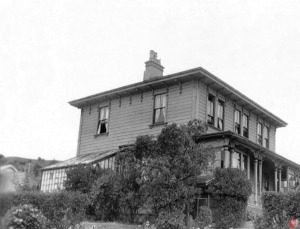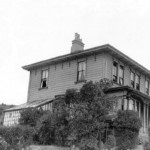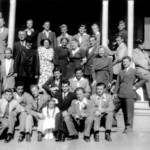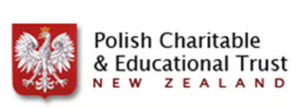Polish Refugees in New Zealand 1944-1951
Exhibitions
Island Bay Boys Hostel

The Polish Boys’ Hostel in Clyde Street, Island Bay, Wellington was opened on 6 May 1946 to house the first boys who left the Polish Children’s Camp in Pahiatua to work or study in Wellington
Polish Children’s Reunion Committee 2004: The hostel’s proper name in the Catholic Archives in Hill Street, Wellington, is Catholic Polish Youth Hostel, but among the Polish people it was referred to as ‘Bursa Męska or Polish Boys’ Hostel.
Sister Monika (Maria) Alexandrowicz was an Ursuline nun who, together with Sister Imelda Tobolska, had shared the children’s fate through Russia and Iran. She worked with those children for 14 years in New Zealand – first as a teacher at the camp and then as a manager of the Polish Boys’ Hostel, followed by the Polish Girls’ Hostel, before she was recalled to Poland. She describes those times very clearly in her memoirs Od Lubcza na Antypody (From Lubecz to the Antipodes):
When the older boys were leaving the camp to go to Wellington, some to St Patrick’s College, Wellington, and some to apprenticeships in carpentry, motor mechanics and other trades, the necessity arose for setting up a hostel for these boys. We were aided in this work by Father John Kavanagh, who was appointed by the Bishops’ Curia to liaise between the Curia and the Government. After negotiating all the conditions with the authorities, both Government and Church, Father John Kavanagh bought a two-storey house in Clyde Street, Island Bay, which was to accommodate 40 Polish boys, some of whom were already working and some attending school.
On the adjacent section there was a very little house which was allotted for our use, Sister Imelda’s and mine. We managed also to set up a little chapel – a converted army hut – between the hostel and our house. So, on 26 August 1946, Sister Imelda and I moved into the Polish Boys’ Hostel in Island Bay, Wellington, beginning a new phase of our work.
Funds for the hostels
Funds for running the hostel were provided mostly by the Government and partly by the working boys who paid for their board. Sister Alexandrowicz said that the New Zealand Government was very supportive of the project to establish hostels for the Polish children who had left the camp and were working or studying in Wellington. Prime Minister Peter Fraser stated that the Polish children must be brought up in a Polish atmosphere and in accordance with the religious and cultural traditions of their homeland. Apparently, he even extracted a promise from his successor that the Polish children would be treated as well as during his term.
Sisters Alexandrowicz and Imelda took turns in running the hostel and the boys were responsible for keeping it clean. In the evenings, Sister Alexandrowicz gave lessons to the boys in Polish language and history. Life was busy.
The boys’ impressions
The two Sisters, as well as the other Ursuline Sisters who came later, were professionally trained to care for young people, so it is not surprising that the boys under their care in the Polish Boys’ Hostel remember the life then as peaceful, the food plentiful and the discipline just.
The atmosphere apparently changed somewhat once civilian staff took over from the Sisters. Some of the civilian staff were obviously less experienced in dealing with young boys and therefore too high-handed in the treatment of their charges. As the boys grew, their desire for independence also grew and trouble arose only when some staff member could not accept that.
Most boys remember the hostel as a safe, good place to live in. Brothers, sisters and friends visited them there. When the Polish Girls’ Hostel was established, the boys would go there to play games, perhaps dance or even take one of the girls to cinema with the permission of Sister Alexandrowicz.
The boys helped not only with the cleaning of the hostel but also with its maintenance. One boy recalls an amusing incident when they were setting- up the vegetable garden. “The hostel had a large plot of land, so one of the male staff decided he would aid in the economy of the hostel by planting potatoes. He remembered how this was done in Poland and that he would need a horse. A friend of the hostel found a horse in Happy Valley and the boys enthusiastically brought it to the hostel. It was duly tied and placed at the beginning of a row, but the horse did not move. No matter how loud and how often the staff member ordered ‘Hetta! Wiœta! Wio! Wio!’ the horse refused to obey. And no wonder – the man used Polish orders to a horse that did not speak Polish!”
Friendly support
Sister Alexandrowicz mentions in her memoirs that during that period they received nothing but kindness, sympathy and offers of help from Prime Minister Peter Fraser down to strangers on the street.
She recalls one lady in particular, Ruby Fleming, who came to the hostel one day and, gesticulating energetically as neither side understood the other, let the Sisters know she wanted to help them. Sister Imelda immediately showed her how to make gołąbki (meat and rice parcels in cabbage leaves) for the day’s dinner. From that day, Mrs Fleming came frequently and became a good friend.
New Zealand’s First Refugees: Pahiatua’s Polish Children (3rd edition); p.334-337






